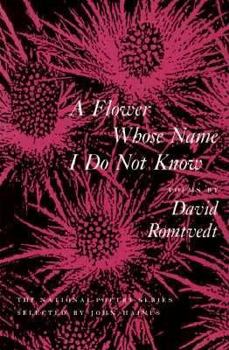A Flower Whose Name I Do Not Know
Select Format
Select Condition 
Book Overview
The third collection from Wyoming poet David Romtvedt focuses on the myth of separateness, both geographic and political. He brings to his writing the insight of many years' work in the peace movement-insight gained from time in the Peace Corps in Zaire, conscientious objection to the draft in the Vietnam era, subsequent work with Poets for Peace, and efforts in opposition to the Trident nuclear submarine base on Puget Sound. His profound commitment results in a poetics of compassionate witness reflecting a lifelong engagement with intellectual and environmental studies and ethnomusicology. Selected by John Haines for the National Poetry Series.
Format:Paperback
Language:English
ISBN:1556590466
ISBN13:9781556590467
Release Date:January 1992
Publisher:Copper Canyon Press
Length:80 Pages
Weight:0.30 lbs.
Dimensions:0.3" x 6.0" x 9.0"
Related Subjects
PoetryCustomer Reviews
1 rating
The Redemptive West of David Romtvedt
Published by Thriftbooks.com User , 26 years ago
David Romtvedt, Wyoming poet and veteran political activist, contributes significantly to the literature of the American West with A Flower Whose Name I Do Not Know, joining a long lime of western poets in his quest for purity. Only through purification is salvation achievable: "a single pure soul/can save the earth." This quest for the pure soul leads Romtvedt outward, expanding the geography of the West from Wyoming, Montana, Arizona, and Alaska to Zaire, Rwanda, the Ukraine, and Japan. Romtvedt seeks redemption through nonviolent resistance, as in "Black Beauty, a Praise," a powerful incantation chanted at the Trident submarine Peace Blockade in 1982, or through social awareness of the terrors of political oppression in Guatemala: "if you push/a series of needles through a person's tongue,/it becomes hard for that person to speak/ and when finally the needles are removed,/it is nearly impossible." Perhaps the pure souls are the activists in small boats blocking the submarine, or perhaps the pure souls are the martyrs of oppression throughout the Third World. But Romtvedt looks homeward also for redemption. He examines his family--his father, an Arizona laborer; his mother, of whom he says, "In my family, it is my mother who can both fly/and sit"; and his sister, who "opens her mouth and swallows" the mushroom cloud of an atomic bomb. Ultimately, though, Romtvedt must look into himself to determine if he is the pure soul who can rescue the world from itself. Thus he deftly mingles time and space, weaving from the town square on Veterans Day to Peace Park, Hiroshima, or fading from Wyoming snows to a Salvadoran clinic. Then again, with expert sleight of hand, he exchanges roles with others--his father, or a woman giving birth--furthering his quest for purity. Romtvedt reminds us that this world is our home, that the one pure soul who can save the earth must be us: "I stand up to walk away./ As I open the door/ I am slapped in the face/ By another world/ And it is this one."






